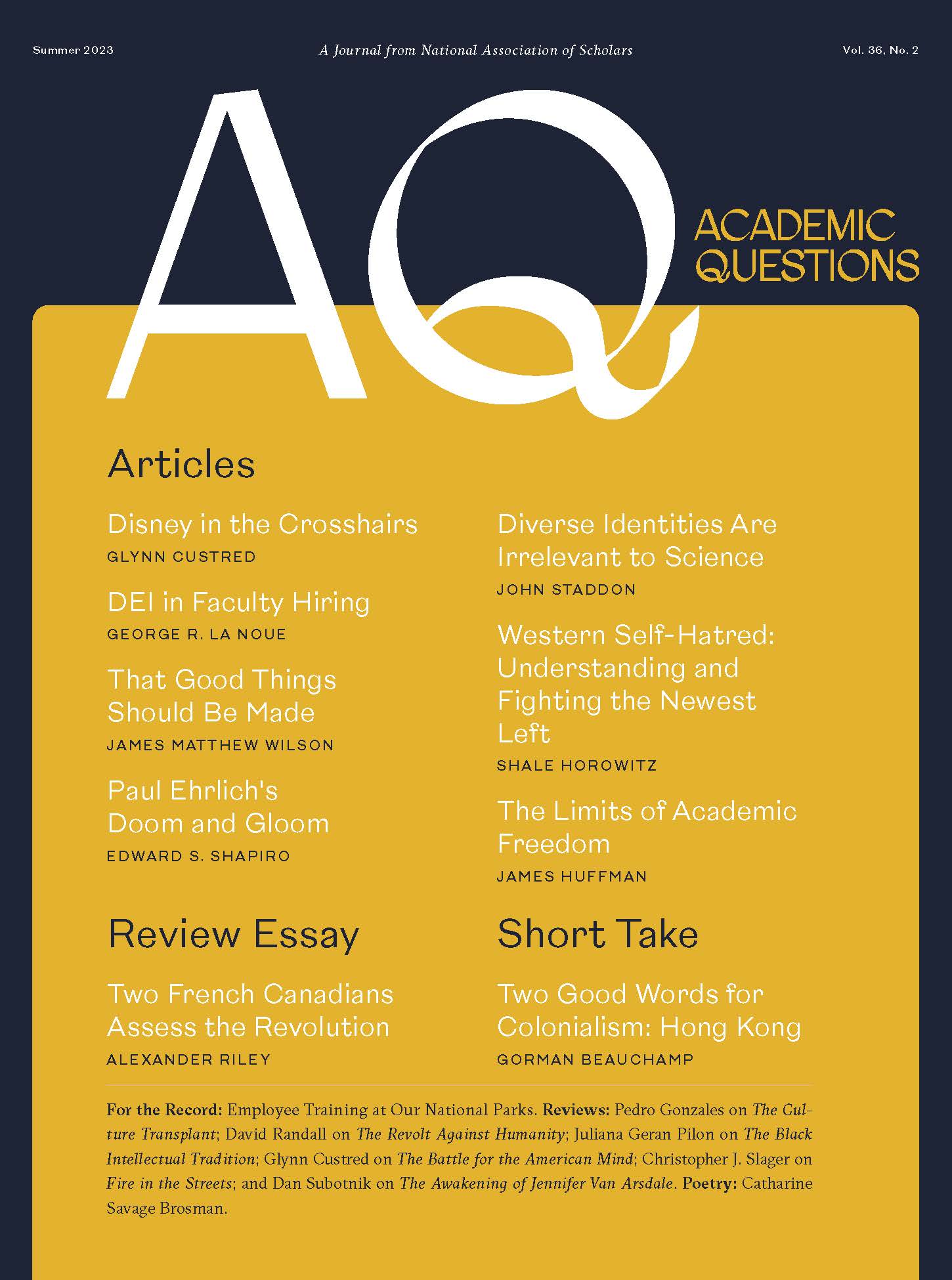Les deux universités: Postmodernisme, néo-féminisme, wokisme et autres doctrines contre la science (French Edition), Robert Leroux, Les éditions du Cerf, 2022, $17.78 softcover.
La Révolution racialiste, et autres virus idéologiques (French Edition), Mathieu Bock-Côté, 2021, Presses de la Cité, pp. 240, $25.21 softcover.
As someone trained as a social scientist with an interest in the ongoing ideological transformation of higher education in the U.S. and elsewhere, I am always on the lookout for others of that professional species, especially those outside the U.S. who share my concern about the woke cultural revolution and have spent time investigating it using the tools of their expertise. These two books offer valuable insights from a pair of academic social scientists from Francophone Canada on the woke phenomenon.
Robert Leroux’s book is a contribution to the critical literature on the broad cultural influence of a whole collection of radical intellectual ideas dating from the mid-twentieth century. He positions himself as a defender of the classic university against what he defines as the postmodern university. Leroux wants to continue the work done by one of his mentors, the late French sociologist Raymond Boudon, one of the most important twentieth century French figures in that discipline. In his book Pourquoi les intellectuels n’aiment pas le libéralisme and other writings. Boudon expertly described and theorized the drift toward simplistic collectivist theories of human behavior and society and the damage this did to the existing ethic of science and higher education. A central driving force for the influence of these ideas was the rise of the mass university. According to Boudon, Western societies decided for political reasons to start sending large numbers of intellectually unprepared young people to post-secondary educational institutions, with the necessary consequence of the dumbing down of intellectual culture in those institutions.
Leroux hits hard on this point. The simple fact is that many and perhaps a majority of the people in higher education in the West have no real commitment to the life of the mind and are unsuited for four years of post-secondary study. Vocational education and employment are no insult and they should be embraced as the proper trajectory for these students. By putting them in four-year colleges and universities, it is inevitable—unless one accepts a huge attrition rate during the first year—that standards in curricula and grading will have to plummet, and they have. One of the demographic ways in which mass universities have adjusted, per Leroux, is by hiring large numbers of comparatively unread new faculty members, essentially political activists for the hyper-democratic worldview masquerading as scholars. Sheer numbers play a role here too. Only a select number of the population have the intellect and ethical commitment to the values of scholarship to do professorial work at a high standard. When you need many more in those positions than that select number of the properly qualified, you can be sure that leveling will result.
Leroux’s criticisms of the content of the ideas of the radicals are pointed and mostly compelling, especially when he is dealing with the intellectually anemic class of race/gender/sexuality identity-obsessed figures of our current moment. Occasionally, however, he wants to sweep thinkers into this dustbin who merit more careful consideration. Pierre Bourdieu, perhaps the single most well-known French figure in twentieth century sociology, certainly wrote some indecipherable things during his lifetime, but it’s too much to make him a “fellow traveler” of postmodernism, as Leroux does. Bourdieu is on the record making stern criticisms of that perspective and many of its central practitioners. Some of Bourdieu’s analyses, like those of Marx, offer insights that are worthy of consideration and debate, even if the political programs adhered to by both are insupportable by careful thinkers. On social class, for example, Bourdieu has given us some profound insights, especially in his book Distinction (1979). Though he leans too much toward determinism, he still manages to elegantly describe much of the process of the incorporation of social class position into individual identity and behavior.
Leroux shares with Boudon a commitment to methodological individualism as a framework for understanding human behavior and social organization. It is perfectly true that structuralist theories are easily manipulated into ideological distortions. At the purest empirical level, social theories that posit anything approaching the kind of determinism we find in the myriad non-rigorous examples of the genre—among which we must number everything that asserts that systemic racism is the cause of all racial disparity—are clearly false. But this does not mean that theoretically more careful and guarded invocations of structure are equally invalid. More, social theories that privilege the individual as the agent of all action, which again is empirically true, must still carefully recognize that distinct boundaries within which individual action takes place are always present, and sometimes they form formidable barriers to courses of action that might otherwise be undertaken by those individuals.
Leroux is also overly inclusive in his dismissal of the French structuralism and poststructuralism of the mid-twentieth century. Some of that work is undoubtedly gibberish at best. Jacques Lacan was an incoherent charlatan, and Louis Althusser was worse than that, a mentally ill murderer of his own wife who admitted he had never read some of the Marxian writings on which he wrote “commentaries” that earned him an intellectual reputation on the left.
Some of the most influential writers in this group, however, including Jacques Derrida, Gilles Deleuze, Jean Baudrillard (at least in the first part of his writing career), and Michel Foucault were much more serious than either the frauds among them or the staggeringly mediocre batch of disciples that flocked to their work in the Anglosphere, especially in the U.S. One can scarcely read Deleuze on Nietzsche and Spinoza, Baudrillard on symbolic exchange and the French left, Foucault on the thought and practice of the Stoics and Cynics, or Derrida on a range of topics (death, religion, the nature of gift-giving, and Jewish identity, for example) and posit that they had not carefully read and analyzed the canonical texts on which they were commenting. The ideas of this group may well be of limited utility for the understanding of sociological topics such as the nature of social inequality. (As someone who has spent considerable time considering them in this light, my view is that they are indeed next to useless for that work). But this does not imply that their readings of culture are as frivolously uninformed as the illiterate blathering that makes up the empty contribution of the inhabitants of contemporary studies programs and departments.
It is when this poststructuralist/postmodernist material is distortedly imported into the social sciences that foolishness can grow and be widely disseminated, with highly injurious results. Leroux gives us some risible examples from his own place of employment, the University of Ottawa. A sociologist there, David Jaclin, is quoted at length on animality, how thought becomes “animalized,” the relationship between animality and animation, all without the slightest indication of the intellectual utility of this for any conceivable scholarly or practical goal, other perhaps than the securing of tenure for Professor Jaclin. I could muster many examples from the writings of some of my own colleagues that are at least as vapid. Leroux is right that the proliferation of thought like this from the cover of a professorial post will eventually destroy the public’s confidence in these institutions, and rightly so. An essential question poses itself here: How did such people get into the academy to begin with?
Leroux’s language is admirably courageous and accurate for an academic, most of whom are too terrified of reprisals to speak the truth about how, e.g., Diversity/Equity/Inclusion efforts have inevitably resulted in naked politicization and a plummeting of the quality of faculty research and student learning. He allows institutions to prove his claims by the content of job announcements that he cites at length, including one from his own employer, the University of Ottawa. The position is for a scholar of “Afro-feminist studies” working “from an intersectional optic on Islamophobia and antiblack racism, solidarities between blacks and indigenous peoples, transnational feminism, black women methods and practices, black queer and trans studies and/or the history and impact of slavery in francophone contexts.” There are perhaps a few woke ideological bases left uncovered there, but the ambition to inclusivity is impressive. It is also noted in the advertisement that the position is open only to “black candidates from Africa or the African diaspora (in the Caribbean, North America, Latin America, etc.).”
Bock-Côté’s book is concerned less than Leroux’s with the (soi-disant) scholarly material driving wokeism and concentrates more at the level of everyday politics, including the consequences in the quotidian operation of colleges and universities. He takes up the French George Floyd, the case of a man named Adama Traoré, and its implications for broader French politics. Traoré was stopped in July 2016 by police in a commune north of Paris while out with a relative, who was wanted for a violent assault on a disabled woman. Traoré himself had just been released from prison a few months before this fateful encounter and had a long rap sheet. He fled from police rather than produce identification, was caught, escaped, was caught again, and then escaped a second time with the help of the violent intervention of an onlooker. He died shortly after arrival at the police station, likely as a consequence of the heavy physical exertion on an extremely hot July day and preexisting health problems. Like George Floyd, if Traoré had simply submitted to the authorities when he was stopped, he would certainly have survived this encounter. Both men, then, whose deaths produced massive social unrest and violence, can adequately be described as having through their own actions produced the situations that ended their lives, whatever the criminal culpability or lack thereof of police involved in the difficult business of trying to apprehend them.
Traoré’s sister subsequently spearheaded a French BLM-like movement based on her brother’s case. She was tried and acquitted of defamation of the officers who arrested her brother. Bock-Côté quotes Geoffroy de Lagasnerie, a radical leftist white academic who co-wrote a book with Traoré’s sister on the affair, summarizing the absurdly conspiratorial politics driving Traoré’s campaign: “We must not define a police killing of a young black as a mistake, a malfunction, but rather as an accomplishment of the logic at work in the social world. We can nearly say, when that happens, ‘School, Police, State: mission accomplished.’” It is, according to Lagasnerie and his woke French comrades, a merciless machinery of “elimination” that is at work against blacks in France. If this is so, it is a puzzlingly inefficient program of extermination, relying as it does on allowing its “targets” to fatally exhaust themselves by repeatedly escaping capture and fleeing in the summer heat.
Bock-Côté makes a compelling critique of Big Media’s desire to purge “hate” from the Internet as part of an ideological campaign. As everyone knows, it is not all hate that is targeted here. Anti-white hate is perfectly fine, perhaps even an inevitable destination reached on a properly woke journey. There is in France an arm of the government to enforce wokeism in media: the Délégation Interministérielle à la Lutte Contre le Racisme, l'Antisémitisme et la Haine anti-LGBT (Interministerial Delegation for the Fight Against Racism, Antisemitism and anti-LGBT Hate), or DILCRAH. Frédéric Potier, the director of this organization, spoke of the “centuries of prejudice and hatred” that existed and would need to be purged in France. This constitutes, in his words, a battle against the “anti-’89,” that is against all those opposed to the French Revolution and its principles. Does this mean that Edmund Burke’s writing on the Revolution constitutes hate speech, Bock-Côté asks?
Both books pointedly attack the Canadian higher education fascination with “l’autochthonisation.” This is the effort to “decolonize” Canadian higher education by explicitly carving out affirmative action-defined positions on faculties and student bodies for “First Peoples,” or Canadian indigenous groups, and also by revolutionizing the institutions in order to accommodate a view of “indigenous culture” carefully formulated by radical activists. To “autochthonize” the university means, for example, to introduce ceremonial drum-making and drumming as part of classroom content, hold classes outdoors in “land-based education” consonant with “First Peoples” cultures, or use Ojibwe poetry and talking stick ceremonies to teach mathematical principles.
Leroux and Bock-Côté detail how intricately such bizarre ideas are tied into the administrative efforts to transform Canadian higher education and culture. We learn from our two authors that, for example, there is a concerted move to promote “autochthonous science” as a form of knowledge alongside “Western” science, otherwise known as science. We are informed by the activists in professorial posts that indigenous physics plays a fundamental role in the understanding of the nature of light, indeed, that it is at the same intellectual level as the work of the Newtons, Plancks, and Einsteins in the West. Indigenous medical knowledge, too, should be added to the repertoire of contemporary medicine for practical use by doctors in order to acknowledge how effectively it dealt with disease in the North American universe prior to the arrival of Europeans. The evidence that indigenous American lifespans were low and dropping before the arrival of Europeans is to be ignored. In this view, “autochthonous” culture had always already arrived at any positive discoveries of Western culture, and without all the horrid evils the latter incarnates.
Autochthonization is one of the peculiarly Canadian aspects of wokeism. In France, wokeism mingles with what Leroux calls “Islamo-leftism” and presents a similar cultural danger. Michel Houellebecq’s 2015 book Submission, which envisions an Islamist cultural revolution in France, is such a powerful novel because it skirts so close to the reality. In the novel, the Islamist takeover is acquiesced to by the dominant French cultural élites, who underestimate the Islamist threat because of their multiculturalist faith and who in any event hate French nationalists much more than they fear Islamism.
These are thoughtful, well-written books. It might nonetheless be complained that too much of both has to do with discussion of the situation in the United States, a topic on which we already have a wealth of material. Many of us in the Anglophone world familiar with French and Québécois cultures would like to believe there is the possibility there for more effective resistance to the revolution our cultures are undergoing. When we are being honest, though, we are not sure what evidence there might be to support that hope, and we fear it may be groundless. Leroux and Bock-Côté give us only a trace of explicit reflection on this question. It is greatly to be hoped that at some point we will get more in the way of such an analysis. Leroux, sadly, passed away late last year, so we will unfortunately be deprived of any further considerations of this topic from him. Bock-Côté, who has moved from Canada to Paris to do cultural commentary there, remains an intellectual source to watch for ongoing analyses of the evolution of wokeism in the Francophone world.
Alexander Riley is Professor of Sociology at Bucknell University whose latest books include Toward a Biosocial Science: Evolutionary Theory, Human Nature, and Social Life (Taylor and Francis, 2021) and Reflecting on the 1960s at 50 (Routledge, 2021); [email protected]. Riley last appeared in AQ in winter 2022 with “Nothing but Shallow Resentment,” a review of Ibram X. Kendi and Keisha N. Blain’s Four Hundred Souls: A Community History of African America (2021).
Photo by Timothée Geenens on Unsplash














